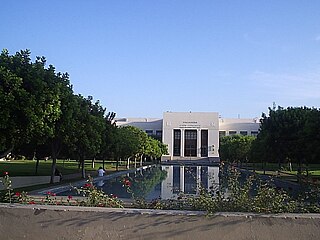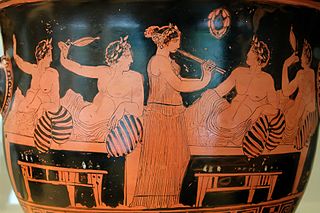Privatization can mean different things including moving something from the public sector into the private sector. It is also sometimes used as a synonym for deregulation when a heavily regulated private company or industry becomes less regulated. Government functions and services may also be privatized; in this case, private entities are tasked with the implementation of government programs or performance of government services that had previously been the purview of state-run agencies. Some examples include revenue collection, law enforcement, and prison management.
A mixed economy is variously defined as an economic system blending elements of market economies with elements of planned economies, free markets with state interventionism, or private enterprise with public enterprise. There is no single definition of a mixed economy, but rather two major definitions. The first of these definitions refers to a mixture of markets with state interventionism, referring to capitalist market economies with strong regulatory oversight, interventionist policies and governmental provision of public services. The second definition is apolitical in nature and strictly refers to an economy containing a mixture of private enterprise with public enterprise.

A cooperative is "an autonomous association of persons united voluntarily to meet their common economic, social, and cultural needs and aspirations through a jointly-owned and democratically-controlled enterprise". Cooperatives may include:
Public property is property that is dedicated to public use and is a subset of state property. The term may be used either to describe the use to which the property is put, or to describe the character of its ownership. This is in contrast to private property, owned by an individual person or artificial entities that represent the financial interests of persons, such as corporations. State ownership, also called public ownership, government ownership or state property, are property interests that are vested in the state, rather than an individual or communities.
A state-owned enterprise (SOE) is a business enterprise where the government or state has significant control through full, majority, or significant minority ownership. Defining characteristics of SOEs are their distinct legal form and operation in commercial affairs and activities. While they may also have public policy objectives, SOEs should be differentiated from government agencies or state entities established to pursue purely nonfinancial objectives.

Public finance is the study of the role of the government in the economy. It is the branch of economics which assesses the government revenue and government expenditure of the public authorities and the adjustment of one or the other to achieve desirable effects and avoid undesirable ones.
State-owned enterprises (SOEs) in New Zealand are registered companies listed under Schedules 1 and 2 of the State-Owned Enterprises Act 1986. Most SOEs are former government departments or agencies that were corporatised. They are responsible to the Minister of State Owned Enterprises.
The public sector is the part of the economy composed of both public services and public enterprises.
Small and medium-sized enterprises (SMEs) or small and medium-sized businesses (SMBs) are businesses whose personnel numbers fall below certain limits. The abbreviation "SME" is used by international organizations such as the World Bank, the United Nations and the World Trade Organization (WTO).
Self-employment is the state of working for oneself rather than an employer.

Public service is a service which is provided by government to people living within its jurisdiction, either directly or by financing provision of services. The term is associated with a social consensus that certain services should be available to all, regardless of income, physical ability or mental acuity. Even where public services are neither publicly provided nor publicly financed, for social and political reasons they are usually subject to regulation going beyond that applying to most economic sectors. Public policy when made in the public's interest and motivations can provide public services. Public service is also a course that can be studied at a college or university. Examples of public services are the fire brigade, police, air force, and paramedics.
A government-sponsored enterprise (GSE) is a type of financial services corporation created by the United States Congress. Their intended function is to enhance the flow of credit to targeted sectors of the economy and to make those segments of the capital market more efficient and transparent, and to reduce the risk to investors and other suppliers of capital. The desired effect of the GSEs is to enhance the availability and reduce the cost of credit to the targeted borrowing sectors primarily by reducing the risk of capital losses to investors: agriculture, home finance and education. Well known GSEs are the Federal National Mortgage Association, or Fannie Mae, and the Federal Home Loan Mortgage Corporation, or Freddie Mac.
In general, compliance means conforming to a rule, such as a specification, policy, standard or law. Regulatory compliance describes the goal that organizations aspire to achieve in their efforts to ensure that they are aware of and take steps to comply with relevant laws, policies, and regulations. Due to the increasing number of regulations and need for operational transparency, organizations are increasingly adopting the use of consolidated and harmonized sets of compliance controls. This approach is used to ensure that all necessary governance requirements can be met without the unnecessary duplication of effort and activity from resources.

A privately held company, private company, or close corporation is a business company owned either by non-governmental organizations or by a relatively small number of shareholders or company members which does not offer or trade its company stock (shares) to the general public on the stock market exchanges, but rather the company's stock is offered, owned and traded or exchanged privately or over-the-counter. More ambiguous terms for a privately held company are closely held corporation, unquoted company, and unlisted company.
The Deutsche Gesellschaft für Internationale Zusammenarbeit (GIZ) GmbH or GIZ in short is a German development agency headquartered in Bonn and Eschborn that provides services in the field of international development cooperation. GIZ mainly implements technical cooperation projects of the Federal Ministry for Economic Cooperation and Development (BMZ), its main commissioning party, although it also works with the private sector and other national and supranational government organizations on a public benefit basis. In its activities GIZ seeks to follow the paradigm of sustainable development, which aims at economic development through social inclusion and environmental protection. GIZ offers consulting and capacity building services in a wide range of areas, including management consulting, rural development, sustainable infrastructure, security and peace-building, social development, governance and democracy, environment and climate change, and economic development and employment.
A crown agency was an administrative body of the British Empire, distinct from the Civil Service Commission of Great Britain or the government administration of the national entity in which it operated. These enterprises were overseen from 1833 to 1974 by the Office of the Crown Agents in London, thereafter named the Crown Agents for Oversea Governments and Administration. Crown Agents for Oversea Governments and Administrations Ltd became a private Limited company providing development services in 1996.
The Public Service of Canada is the civil service of the Government of Canada. Its function is to serve as the staff of the Canadian Crown. The Clerk of the Privy Council, as Canada's senior serving civil servant, is head of the Public Service of Canada.
Canadian Crown corporations are state-owned enterprises owned by the Sovereign of Canada. They are established by an Act of Parliament or Act of a provincial legislature and report to that body via a minister of the Crown in the relevant cabinet, though they are "shielded from constant government intervention and legislative oversight" and thus "generally enjoy greater freedom from direct political control than government departments."










